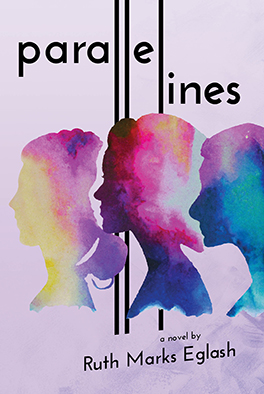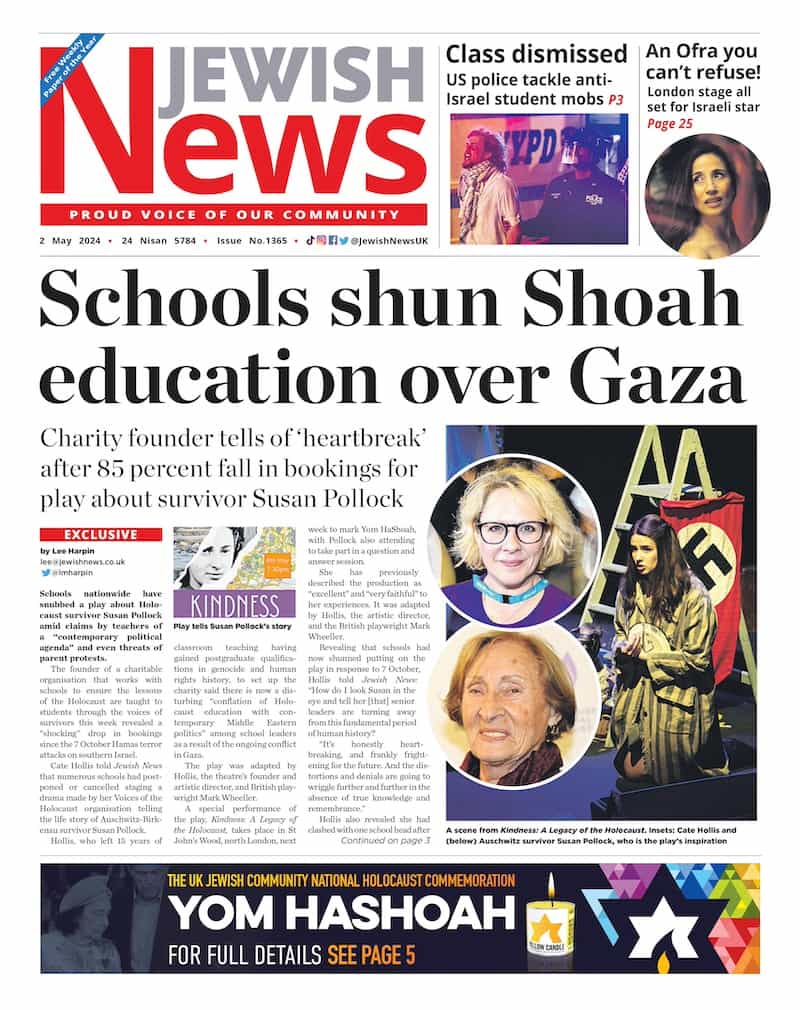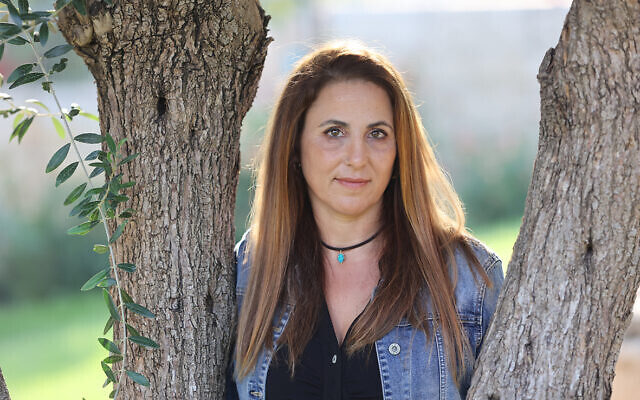Washington Post Jerusalem correspondent turns fact into fiction
Journalist Ruth Marks Eglash has written a novel highlighting the human aspect of the Israel-Palestine conflict
As a Jerusalem correspondent for The Washington Post there were few aspects of the conflict that Ruth Marks Eglash was not called upon to cover. Between 2013 and 2020 she saw it all – stabbings, shootings, car-rammings, the continuous cycle of renewed hostilities, the fragility of the peace process.
But in the eight years that she churned out breaking news for the publication, Eglash – a native north Londoner who moved from Edgware to Israel nearly 30 years ago – realised that a tight word count and matter-of-fact reporting could never do justice to everything she saw and heard. There were, she believed, still so many more stories to tell.
Added to that was a far more personal layer of wanting to explain the conflict – as best she could – to her three children, Gefen, Ben and Ela, who were struggling to understand what was happening around them at a time of increasing violence.
So began the idea five years ago to use those untold stories for a fictionalised narrative of the conflict as seen through the eyes of three teenage girls from vastly different backgrounds.
The result is her young adult debut novel, Parallel Lines, which revolves around Tamar, a secular Jew; Rivki, who comes from a Charedi community; and Nour, a Palestinian Muslim. Co-existing in Jerusalem, their lives seldom intersect until a terrorist attack on the light rail train brings them together in ways they could never have anticipated.
Speaking to Jewish News from her home in Jerusalem, Eglash reveals that writing her first work of fiction after decades of reporting on the conflict was in many ways “therapeutic”.
The 51-year-old veteran journalist, who currently writes for Jewish Insider and Fox News, said: “When you write a news article it’s sanitised, structured and written in a certain format. You can’t put feeling into it, just the facts. So in writing this book I was finally getting out my feelings and emotions on this conflict that I’ve been covering so closely.”
She acknowledges that she was “uniquely privileged” as a British-Israeli and Jewish journalist working for the foreign media in Israel and specifically, “one of the biggest, most influential newspapers in the world.”
 While many other journalists might have felt unsure about going into the Palestinian territories to cover a story for a Jewish title, Eglash says as a Washington Post correspondent she felt able to “access all sides”, giving her a different insight and empathy into the conflict.
While many other journalists might have felt unsure about going into the Palestinian territories to cover a story for a Jewish title, Eglash says as a Washington Post correspondent she felt able to “access all sides”, giving her a different insight and empathy into the conflict.
“Journalists here are like first responders,” she explains. “We get to a site immediately after there’s been an attack or we sit with a family that’s just lost a loved one and we listen to their heartbreak. You’re thinking about how you’re going to shape that story, but at the same time you’re sitting in front of someone who’s just had this huge, devastating loss and it hits you. That has happened to me several times. It’s almost like you absorb their sorrow.”
She recalls how in 2014 she secured an exclusive interview with the mother of Naftali Fraenkel, one of three Israeli teenagers kidnapped and murdered by terrorists in Hebron. At the time of their interview, the fate of Naftali was unknown.
“She didn’t know whether he was dead or alive. You try to be just a journalist, but at the end of the day, I’m also human and a mother and it was impossible not to connect. It was heart-breaking and you really feel for these for these families, you feel their pain.
“Equally there were times I would go and interview a Palestinian family whose son had gone and carried out a terror attack, and they are in mourning as well. I came to understand it doesn’t matter if they’re Jewish or Palestinian – everyone feels the pain of losing a child or a loved one in the same way.”
While there was little opportunity to incorporate that emotion into a hard news report, Eglash instead banked those experiences for when she would eventually write her novel.
Seeing Parallel Lines in print is something of a lifelong ambition fulfilled, she says, having harboured a desire to become a writer since she was a child.
“I always wanted to be a writer, I always wanted to write books,” she recalls with a smile. “I got my first typewriter when I was eight and I used to write stories with it all the time. When I was about 12, I hand-wrote my first ever book in my neatest handwriting and sent it off to Corgi Books. They sent me a very lovely rejection letter saying it doesn’t quite fit our books right now, but encouraging me to keep on writing. And so I did.”
For 30 years Eglash honed her skills as a journalist, but all the while she churned over the idea of writing a work of fiction. The first seeds were sown when her eldest daughter, Gefen, then 12, started going to school in the centre of Jerusalem during a renewed wave of violence in the Israeli capital.
“She came home asking me, ‘Why are there people who hate us? What did we do to them?’ I began to think about how we don’t really think about the impact this conflict is having on young people.”
The experiences of Gefen, now 21, and her teenage friends largely inspired the character of Tamar, while Eglash also sat down with young ultra-Orthodox girls to help flesh out the story behind Rivki. She also spoke with several young Palestinian women to shape the character of Nour. “It was interesting to hear their experience of growing up in Jerusalem under Israeli sovereignty and their take on the conflict.”
Eglash admits it was not a conscious decision to narrate the conflict through the voices of three young females, but is glad her novel turned out that way.
“I think it’s a good thing to tell the story from their perspective, because we don’t always hear that,” she explains. “As journalists we always hear the loudest voices and those tend to be the most extreme – we don’t always pay attention to the more moderate voices, which often belong to women and which advocate for something other than combat and violence.”
Having covered the conflict over decades and spoken to those whose lives have been impacted on both sides, Eglash may well be in a stronger position than most to understand the causes and the solution – but the Israel-Palestinian conflict is far more nuanced than people realise, as Parallel Lines shows.
“People see this conflict in such simplistic terms, but it’s so very not,” she explains. “In fact, it’s very, very complicated and there is no straightforward answer. If there is one message we can take, it’s that everyone has their narrative and everyone has their claim. We need to find a way we can live together.”
Parallel Lines by Ruth Marks Eglash is published by Black Rose Writing, £15.95
Cover photo by Ariel Jerozilimski

Thank you for helping to make Jewish News the leading source of news and opinion for the UK Jewish community. Today we're asking for your invaluable help to continue putting our community first in everything we do.
For as little as £5 a month you can help sustain the vital work we do in celebrating and standing up for Jewish life in Britain.
Jewish News holds our community together and keeps us connected. Like a synagogue, it’s where people turn to feel part of something bigger. It also proudly shows the rest of Britain the vibrancy and rich culture of modern Jewish life.
You can make a quick and easy one-off or monthly contribution of £5, £10, £20 or any other sum you’re comfortable with.
100% of your donation will help us continue celebrating our community, in all its dynamic diversity...
Engaging
Being a community platform means so much more than producing a newspaper and website. One of our proudest roles is media partnering with our invaluable charities to amplify the outstanding work they do to help us all.
Celebrating
There’s no shortage of oys in the world but Jewish News takes every opportunity to celebrate the joys too, through projects like Night of Heroes, 40 Under 40 and other compelling countdowns that make the community kvell with pride.
Pioneering
In the first collaboration between media outlets from different faiths, Jewish News worked with British Muslim TV and Church Times to produce a list of young activists leading the way on interfaith understanding.
Campaigning
Royal Mail issued a stamp honouring Holocaust hero Sir Nicholas Winton after a Jewish News campaign attracted more than 100,000 backers. Jewish Newsalso produces special editions of the paper highlighting pressing issues including mental health and Holocaust remembrance.
Easy access
In an age when news is readily accessible, Jewish News provides high-quality content free online and offline, removing any financial barriers to connecting people.
Voice of our community to wider society
The Jewish News team regularly appears on TV, radio and on the pages of the national press to comment on stories about the Jewish community. Easy access to the paper on the streets of London also means Jewish News provides an invaluable window into the community for the country at large.
We hope you agree all this is worth preserving.






















